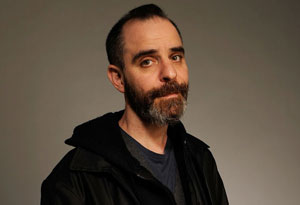Poetry That Will Get You Through a Hard Time
Five writers recall their darkest hours and the poems that sustained them.

Photo: Getty Images
PAGE 4
David Rakoff comes through with a little help from Elizabeth Bishop.
I have been using Elizabeth Bishop's "Letter to N.Y." for the last few years just as reliantly and regularly as I take aspirin for headaches. Every few weeks or so, I have an MRI to check on a tumor that has tenaciously nestled itself behind my collarbone. The hope of each scan is that the chemotherapy I'm regularly receiving is working and the mass is getting smaller and my brilliant surgeon will soon be able to work her magic without having to amputate my left arm.
"Letter to N.Y." is perfect for the coffin (that is what the MRI is, make no mistake). To the adept claustrophobe, all those assurances that the machine is a brilliant, lifesaving diagnostic marvel are nothing but noise when confronted with a ceiling scarcely four inches from one's face. To open your eyes, I hardly need advise you, would be a grievous mistake.
In addition, it is vital not to start reciting too early. To do so would rob the poem of its calming, analgesic power. It is not until I have undressed and divested my body of all metal and put on my hospital gown, not until the tranquilizer has started to kick in and my breathing has become less ragged and more cello-like and I am on the slab being scanned, that I begin my incantation.
To be sure, the content of Bishop's lines is secondary to the busywork of recitation. It is in the task where the distracting, meditative cure lies. But then, from out of the darkness come the barely-seen flashes of meaning, like the nighttime trees of Central Park whizzing past a taxi window, or the half-heard innuendo struggling through the muzzy din of some after-hours joint.
Lying on the table, it can sometimes feel like I've been in treatment longer than I've been alive; that my world has contracted and been bricked over and this is who I am and will only ever be. There is solace in the poem's portrait of New York City, my home for close to three decades. It's a New York not just of my healthier but of my younger self. And it's nice to think of it all still being there, waiting for me, just as soon as I get up and walk out of this room.
Letter to N.Y. (for Louise Craine)
In your next letter I wish you'd say
where you are going and what you are doing;
how are the plays, and after the plays
what other pleasures you're pursuing:
taking cabs in the middle of the night,
driving as if to save your soul
where the road goes round and round the park
and the meter glares like a moral owl,
and the trees look so queer and green
standing alone in big black caves
and suddenly you're in a different place
where everything seems to happen in waves,
and most of the jokes you just can't catch,
like dirty words rubbed off a slate,
and the songs are loud but somehow dim
and it gets so terribly late,
and coming out of the brownstone house
to the gray sidewalk, the watered street,
one side of the buildings rises with the sun
like a glistening field of wheat.
—Wheat, not oats, dear. I'm afraid
if it's wheat it's none of your sowing,
nevertheless I'd like to know
what you are doing and where you are going.
—Elizabeth Bishop
David Rakoff is the author of three essay collections, including, most recently Half Empty (Doubleday).
Keep Reading: David Rakoff on loving other people's dogs
Next: Kim Rosen describes losing her life savings
Excerpted from Poems, by Elizabeth Bishop, published by Farrar, Straus and Giroux, LLC. Copyright ©2011 Alice Methfessel Trust. All rights reserved.



